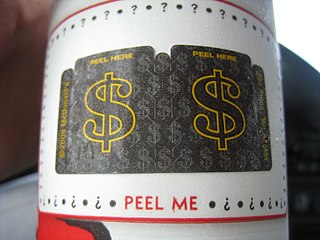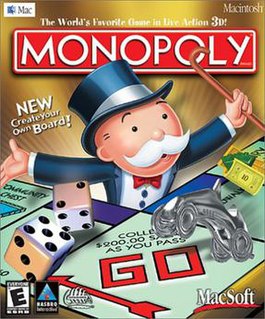External links
| | This board game-related article or section is a stub. You can help Wikipedia by expanding it. |
| Publishers | Avalon Hill |
|---|---|
| Random chance | Medium |
| Skills required | Strategic thought |
Squander (written as "$QUANDER" on the box and in the rules) is an Avalon Hill board game published in 1965. It is based loosely on the game Monopoly, but in reverse. As in Monopoly, players roll dice and move around a board, encountering opportunities to make financial decisions. The object, however, is to lose money rather than gain it. Each player starts with a million "Squanderbucks" and the winner is the first player to become bankrupt.

Board games are tabletop games that typically use pieces - moved or placed on a pre-marked board and often include elements of table, card, role-playing, and miniatures games as well.

Monopoly is a multi-player economics-themed board game. In the game, players roll two dice to move around the game board, buying and trading properties, and developing them with houses and hotels. Players collect rent from their opponents, with the goal being to drive them into bankruptcy. Money can also be gained or lost through Chance and Community Chest cards, and tax squares. Players receive a stipend every time they pass "Go", and can end up in jail, from which they cannot move until they have met one of three conditions. The game has numerous house rules, and hundreds of different editions exist, as well as many spin-offs and related media. Monopoly has become a part of international popular culture, having been licensed locally in more than 103 countries and printed in more than 37 languages.
Anti-Monopoly is a board game made by San Francisco State University Professor Ralph Anspach in response to Monopoly. The idea of an anti-monopoly board game dates to 1903 and the original Monopoly created by Lizzie Magie.

Rich Uncle Pennybags is the mascot of the board game of Monopoly. He is depicted as a portly old man with a moustache who wears a morning suit with a bowtie and top hat. In large parts of the world he is known, additionally or exclusively, as the Monopoly Man, or Mr. Monopoly. He also appears in the related games Advance to Boardwalk, Free Parking, Don't Go to Jail, Monopoly City, Monopoly Junior, and Monopoly Deal.

SolarQuest is a space-age real estate trading board game published in 1985 and developed by Valen Brost, who conceived the idea in 1976. The game is patterned after Monopoly, but it replaces pewter tokens with rocket ships and hotels with metallic fuel stations. Players travel around the sun acquiring monopolies of planets, moons, and man-made space structures. They seek to knock their opponents out of the game through bankruptcy, as well as optional laser blasts and dwindling fuel supplies.

The McDonald's Monopoly game is a sales promotion run by fast food restaurant chain McDonald's, with a theme based on the Hasbro board game Monopoly. The game first ran in the U.S. in 1987 and has since been used worldwide.
Monopoly Junior is a simplified version of the board game Monopoly, designed for young children, which was originally released in 1990. It has a rectangular board that is smaller than the standard game and rather than using street names it is based on a city's amusements to make the game more child-friendly. There are many different models of the game.

Monopoly Tycoon is a construction and management simulation PC game published in 2001. The player operates a business that owns stores and apartments in a city derived from the Monopoly board game. Instead of using dice, the game relies more on the speed and innovativeness of the players. In the standard mode, the user plays against the AI opponents. In the multiplayer version, players go against other online players in order to gain victory.
Don't Go to Jail is a 1991 Parker Brothers dice game for two or more players inspired by Monopoly. The game is played by rolling ten dice and attempting to roll matches to score points.

There have been several video game adaptations of Parker Brothers and Hasbro's board game Monopoly.

The board game Monopoly has its origin in the early 20th century. The earliest known version, known as The Landlord's Game, was designed by an American, Elizabeth Magie, and first patented in 1904 but existed as early as 1902. Magie, a follower of Henry George, originally intended The Landlord's Game to illustrate the economic consequences of Ricardo's Law of economic rent and the Georgist concepts of economic privilege and land value taxation. A series of board games was developed from 1906 through the 1930s that involved the buying and selling of land and the development of that land. By 1933, a board game had been created much like the modern version of Monopoly sold by Parker Brothers and its related companies through the rest of the 20th century, and into the 21st. Several people, mostly in the midwestern United States and near the East Coast of the United States, contributed to design and evolution.
Easy Money was a board game introduced by Milton Bradley Company in 1935. Like Monopoly, the game is based on The Landlord's Game in the movement of pieces around the board, the use of cards, properties that can be purchased, and houses that can be established on them.
Finance, or The Fascinating Game of Finance or Finance and Fortune, is a board game originally released in 1932. The game is based on The Landlord's Game in the movement of pieces around the board, the use of cards, properties that can be purchased, and houses that can be erected on them. The game also has railroads; however, these may not be purchased. The game is a predecessor to Monopoly.
Family Game Night was an American television game show based on Hasbro's family of board games and EA's video game franchise of the same name. The show was hosted by Todd Newton. Burton Richardson announced for the first two seasons, until he was replaced by Stacey J. Aswad for the third season, and then Andrew Kishino beginning in the fourth season. The 60-minute program debuted on October 10, 2010, on The Hub, formerly Discovery Kids. The network would become Discovery Family on October 13, 2014; it was previewed on October 9, 2010, on its sister channel, TLC. Seasons 1 and 2 each contained 26(1) and 30(2) episodes. Seasons 3, 4 and 5 each contained 15 episodes. Season two premiered on Friday, September 2, 2011, and additional games were added. The games added to the second season included Cranium Brain Breaks, Green Scream, Ratuki Go-Round, Simon Flash, Operation Sam Dunk, Trouble Pop Quiz, and Spelling Bee. However, games from the previous season were still kept.

Automonopoli, also known as Go to Jail, is an unauthorised computer version of the boardgame Monopoly, released in June 1983 by Automata UK for the ZX Spectrum. Although other two-player Monopoly computer programs already existed, the developer advertised that their Automonopoli was the first with an artificial intelligence strong enough to compete against and defeat human players.

Monopoly Millionaires' Club (MMC) was a series of 16 scratchcard games that differed by its participating lotteries; its players could become eligible to be flown to Las Vegas to take part in an episode of the Monopoly Millionaires′ Club game show

Monopoly is a 1995 video game based on the board game Monopoly. Developed by Westwood Studios, published by Hasbro Electronic Entertainment and distributed by Virgin Interactive Entertainment. This title was one of many inspired by the property. It was later reissued in 1998 with a different box art.

Monopoly is a PlayStation video game based on the board game Monopoly, released on November 6, 1997. Developed by Gremlin Interactive and published by Hasbro Interactive, this title was one of many inspired by the property. Despite using the same box art as the 1995 PC version of Monopoly, it is not the same game.

Monopoly is a 1999 computer game based on the board game Monopoly, released for Microsoft Windows and Macintosh. Developed by Artech Studios, it was published by Hasbro Interactive, Inc. for Windows and MacSoft for the Mac. This title was one of many inspired by the property-dealing board game. It uses the same box art as a 1998 reissue of the 1995 Monopoly PC game. This game proved to be popular and was re-released as Monopoly New Edition on September 30, 2002, published by Infogrames. The only major difference between this game and its re-release was the absence of the board editor in Monopoly 3. A PlayStation Portable version of this game was released in 2008.
Ms. Monopoly is a version of Monopoly based on women. It was released by Hasbro in 2019.